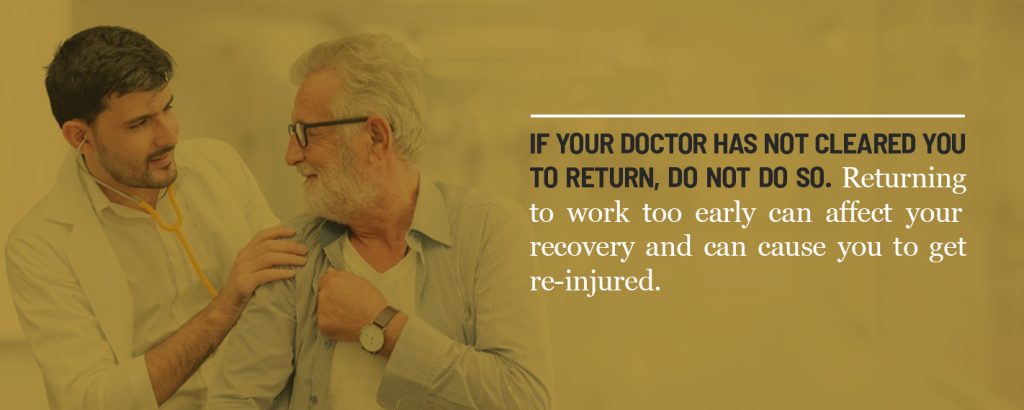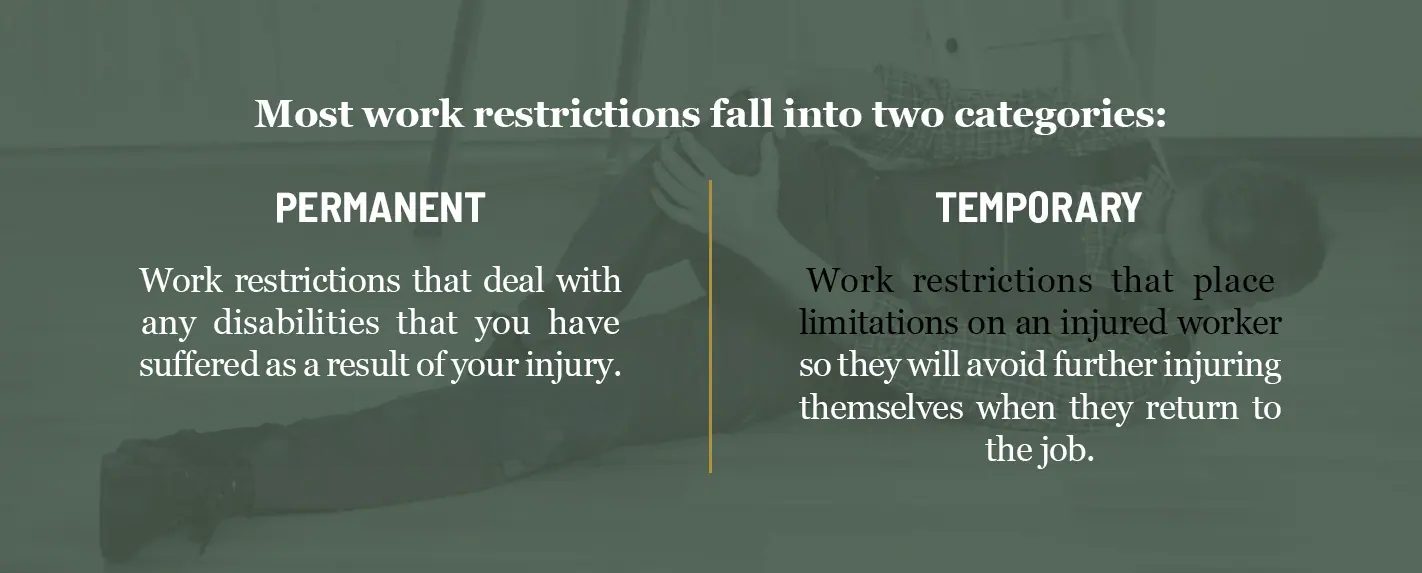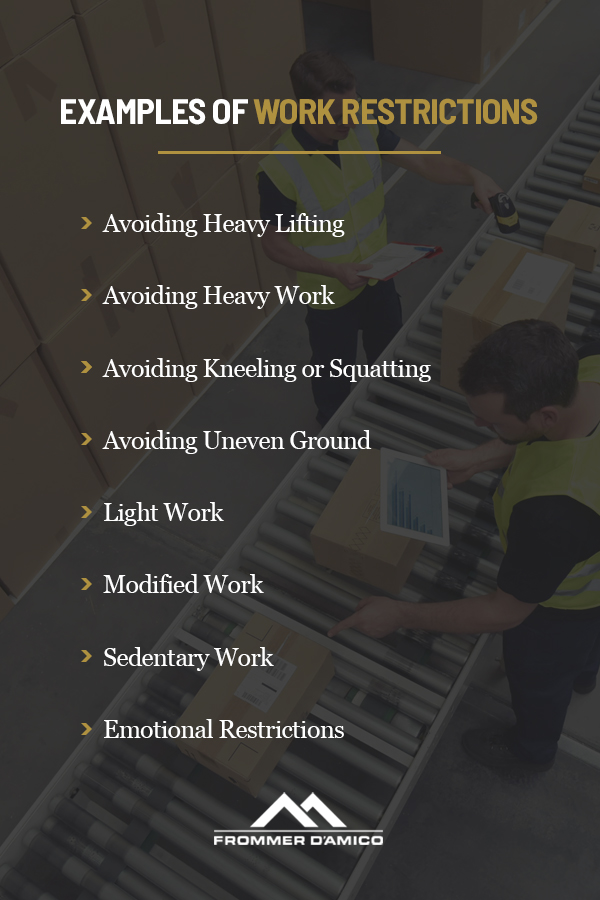Table of Contents
For workers injured on the job, their primary goal is to return to work. While some injuries make that impossible, injured workers often want to return to the job because work help gives them meaning and purpose. Workers’ compensation is very helpful for covering financial and medical costs while injured, but workers’ comp return to work doesn’t take the place of a full-time salary and benefits.
Returning to work after workers’ compensation, however, needs to be done carefully. Injured workers want to make sure that they’ve fully recovered from their injuries or that their doctor has told them that they’ve recovered as much as are going to recover. Once an injured worker has recovered enough from their injury to return to their previous employment, here are some tips on how to make that transition easier for the worker and their employer.
Keep in Contact With Your Employer
It’s always a good idea to keep your employer informed about your medical progress, especially if you plan returning to work after injury when medically approved. Stay in touch with your employer and work with your supervisor. Let them know how you’re feeling, what your doctor is telling you about your injury, and how soon you may be able to return to work. Staying in touch is a way of showing your employer that you’re not “faking it” or trying to take advantage of the situation.
There are practical reasons for doing this as well. By communicating with your employer, they will also be better prepared when you are ready to return to the job. For instance, if you need to work with some medical restrictions, and you have been talking to your employer regularly about your medical progress, it will be easier for them to find a job that accommodates these return to work restrictions. Just showing up at work one day and saying, “I’m back” makes this a much more difficult process.
It’s essential, however, not to let your employer or their insurance company turn your desire to ensure good communication into a way to pressure you to return to the job too early. Insurance companies will try to use any trick to reduce return to work workers’ compensation payments and so may use your desire to be a good employee against you. If you feel you are being pressured to return to the job before you or your doctor feel you are ready, contact a workers’ compensation lawyer immediately.
Do Not Go Back to Work Before You Are Ready
If your doctor has not cleared you to return, do not do so. Returning to work too early may affect your recovery and can cause you to get re-injured. Even if you feel well enough to return to work, but your doctor has not cleared you to do so, you may want to listen to your doctor. You want to make sure you can perform work tasks to the best of your ability. Returning to the job before you are ready may be asking for trouble. Your doctor may want you to return with medical restrictions that you will need to follow if you want to achieve a full recovery. If you return to work on your own initiative and against your doctor’s advice, and re-injure yourself, this may only lead to more frustrations for you and your employer. My employer won’t let me return to work after injury? If you are feeling financial pressure, or pressure from your employer, to not return to work, return to work before you are ready, or before your doctor clears you to work, you should call us to discuss your specific situation to protect your health and your workers’ comp benefits.
If you are considering going back to work after injury and your Pennsylvania workers’ comp benefits have been denied or modified because you are concerned about finances, speak to your workers’ compensation attorney. Your attorney can review your options with you and may be able to seek benefits for you, if you cannot work.
What to Do If You Have Been Ordered to Do so by Your PA Workers’ Comp Doctor
If your doctor says you can return to work, talk to them about what your job duties will be when you return to the job. Ask them if they believe that you will need any medical restrictions. For instance, if your job before your injury required that you do a lot of heavy lifting, ask your doctor if they think you’re ready to do as much lifting as you did before your injury.
Returning to work after workers’ comp can be daunting, especially if you are not sure you have healed enough to return to your job duties. In Pennsylvania, as part of the workers’ compensation process, and as part of your employer’s own workers’ comp return to work after injury policy, you may be asked to go to an Independent Medical Examination (IME).
If an IME or treating doctor decides you can return to your job, you will be sent a Notice of Ability to Return to Work. This notice should appear before you get any job offer from your employer and before you return to work. The Notice of Ability to Return to Work is filed any time your medical condition is considered changed enough to warrant a return to work.
If you personally feel that you’ve not fully recovered, but your doctor releases you to return to work, and you decide not to return, you may lose your right to receive workers’ comp benefits. If your workers’ compensation doctor orders you to return to work and you don’t feel you’re ready, contact your Pennsylvania attorney.
Your attorney can help you get a second opinion or suggest an incremental return to work, which may be easier on your healing injuries if you have been away from work. Your attorney can also ensure you follow the doctor’s orders.
If your doctor orders you to return to work after injury, and you feel you are ready, there are certain steps that both you and your employer need to follow to ensure a timely return.
My Personal Doctor and the Company Doctor Don’t Agree – What Should I Do?
One thing that can happen after a work injury is company doctor or an IME doctor will conclude you are ready to return to work, but your own doctor may not agree. If this is the case, contact a return to work workers’ compensation attorney. You do not want to return to work before you are healed as this can affect your health. In these cases, legal redress may be needed to resolve the issue.
What Is a Return to Work Form?
If you have been receiving workers’ compensation benefits after you have been injured on the job, receiving a Notice of Ability to Return to Work can raise many questions in your mind. What does this form mean? Does this mean I have to return to work immediately? What will happen if I don’t return to work immediately? What will happen to my workers’ compensation benefits?
If you receive a Notice of Ability to Return to Work, you should immediately contact your lawyer who can help you understand what your rights are in this situation.
Despite its title, a Notice of Ability to Return to Work does not mean that you need to return to work immediately or that you will lose your benefits right away. The insurance company sends this kind of notice when it is considering ending your benefits. Therefore, as soon as you receive one of these notices, you should immediately consult a lawyer.
Insurance companies normally send a Notice of Ability to Return to Work when they have received new information about your ability to perform the job you were doing before you were injured. This information includes:
- New work restrictions ordered by your physician
- Your medical condition has changed
Whenever the insurance company receives this kind of new information, it must send out the notice. It often serves as a foreshadowing of a request to suspend or change your return to work workers compensation benefits. Injured workers regularly receive this kind of notice after they’ve taken an IME. After you receive a Notice of Ability to Return to Work, your employer may file a Petition to Terminate, Modify or Suspend Benefits. You may be offered a light job at your place of work. Before your workers’ compensation benefits are suspended or cut off, and before you return to work after a workers’ comp injury, a judge will generally examine the case.
It only takes a tiny change in your medical condition, such as the ability to lift a few more pounds of weight than when you were checked the last time, to result in the sending of the notice. It doesn’t matter if the new weight limit is still far below what you were previously able to do, insurance companies look for ways to limit or end injured workers’ benefits.
Otherwise, receiving a Notice of an Ability to Return to Work helps outline some of the work restrictions that your employer needs to observe. Officially known as a Section 306(b)(3) Notice, a Notice of Ability to Return to Work should contain the following information:
- A description of the injured worker’s current physical condition or change in that condition.
- Any work restrictions such as how many hours a day worker should work or if they need to be put on modified duty.
- Notice that the injured worker has an obligation to look for available work.
- Notice that, if a worker has turned down available employment, it may jeopardize the right to receive workers’ compensation benefits now or in the future.
- Notice that the injured worker has a right to talk to a lawyer.
Can I Be Forced Back to Work After Injury?
No. After you have received a Notice of Ability to Return to Work you cannot be forced back to work after injury while you are still injured. For instance, you and your physician can protest the medical information that’s been cited in the notice. Your lawyer can help you gather the evidence that supports your claim and proves that you are unable to return to work. In some cases, this kind of litigation can take as long as a year to decide.
It’s a perfectly natural feeling to be scared or worried when you receive this notice. Injured workers like yourself who receive a Notice of Ability to Return to Work are afraid of making their injury worse by returning to work after an injury too early or finding another injury has resulted when they do. Injured workers need to get healthy and they need to be able to return to the job on their own timetable that is determined between them and their physician.
Before asking yourself, “Can I return to work after a workers’ comp settlement?” make sure to bring the Notice of Ability to Return to Work to your attorney immediately. Attorneys like those at Frommer D’Amico can advise you on what your next move should be.
Schedule A Free Consultation today!
What Are Work Restrictions?
In most cases, work restrictions given to you by your physician indicate the difference between the work you did before your injury and the kind of work that you can do during your recovery. Sometimes the restrictions can be temporary — for example, work restrictions placed upon you after surgery that will gradually be lifted as you move towards full recovery. In some cases, however, depending upon the nature of your injury, these may be workers comp return to work restrictions that you are required to observe for the rest of your working life.
Most work restrictions fall into two categories:
- Permanent: Work restrictions that deal with any disabilities that you have suffered as a result of your injury. Doctors will use these restrictions to describe what you can actually do when you return to your workplace. Sometimes the restrictions will be permanent ones. They may indicate that you may not be able to earn the wages in a new job as you did before the injury. In this case, workers’ compensation benefits are available to offset most of the difference between your old wage and your new wage.
- Temporary: Work restrictions that place limitations on an injured worker so they will avoid further injuring themselves when they return to the job. For instance, after surgery, your doctor may decide that you can only lift 10 pounds. As you heal, your physician can change that work restriction to reflect an ability to lift more weight.
Examples of Work Restrictions
Work restrictions given to you by a physician normally reflect how an injury to a particular part of your body affects your ability to do work. As noted above, sometimes the work restrictions will be temporary, and sometimes they will be permanent. Here are some examples of the kind of work restrictions a physician can recommend to an employer:
1. Avoiding Heavy Lifting
Avoiding heavy lifting doesn’t necessarily have a weight target. It has more to do with the total lifting effort — frequency, body position, endurance and more. Heavy lifting might be 50 pounds for one injured worker and 10 pounds for another.
2. Avoiding Heavy Work
This restriction typically involves other forms of physical activity such as pushing, stooping, bending, climbing and can occasionally involve lifting. A physician may not want an injured worker to do too much of this, especially after surgery or while they are still undergoing physical therapy.
3. Avoiding Kneeling or Squatting
This is the kind of work restriction a physician could apply if a worker has injured their knee or their back. If this was an essential element of what a worker had done in their job before their injury, their employer could work to find them a new role that did not require as much kneeling or squatting.
4. Avoiding Uneven Ground
Sometimes the nature of a worker’s injury means they find walking on uneven terrain very difficult. This could be the result of an injury to a foot, a leg, a knee or a back. This could be the case for construction workers, surveyors or people who work outdoors. If a work restriction from a physician recommends that a worker not walk on uneven ground for fear they could re-injure themselves, the employer and the injured worker should work together on finding a new job that doesn’t require working on this kind of terrain.
5. Modified Work
This restriction deals with how much work a returning injured worker could do in a standing or walking position. It usually calls for a minimum of physical effort for either task. A physician may request rest breaks to take place regularly so as not to overdo any physical strain.
6. Modified Work
If a physician recommends modified work, it typically means that an injured worker can return to their previous job but with some restrictions or changes. For instance, if the job previously required standing for long periods of time, a physician may recommend that the employee be allowed to work from a seated position if possible. If the job required the employee to do lots of walking within the facility, the physician can recommend that the employee and the employer consider ways that the employee could move around the facility without doing as much walking.
7. Sedentary Work
This requires that an injured worker who is returning to their place of employment spend as little time as possible standing and walking and predominantly work at a bench, table or desk. This could be a temporary work restriction, but, if the injury is severe enough, it may be a permanent limitation.
8. Emotional Restrictions
This doesn’t mean that an injured worker needs to be in a position totally devoid of stress. All work involves some stress. This work restriction means that an employer should avoid placing an injured worker in a situation that could create irritability, tension or nervousness. This is an ideal situation where the employer and the injured employee can work together to develop a plan that would avoid placing the employee in these kinds of situations.
These are only some of the kinds of work restrictions that a doctor or an independent medical examiner can recommend to an employer for an injured worker who wants to return to the job. Work restrictions truly do depend upon the kind of injury suffered by the worker and should reflect the worker’s ability to perform a task based on their injury or disability.
Create a Reintegration Plan With Your Employer
Taking the time to create an effective Return to Work Plan is good for both you and your employer. It indicates to your employer that you have a legitimate interest in returning to work and allows you to reintegrate back into your workplace on an appropriate and effective timeline.
The Pennsylvania Department of Labor through its Workers’ Compensation Services branch offers a guide to creating an effective return to work plan. A good plan should include the following elements:
- A Return to Work Plan should not be made just between you and your employer, but should also include all the relevant people who should be aware that you are returning to work and that you may have some work restrictions. This includes your immediate supervisor, your workers’ compensation representative, your company’s HR department and any other appropriate person.
- It should contain an acknowledgment from your employer that they understand the restrictions placed on you by your doctor and that they will do their best to observe them.
- A detailed outline of how your employer will provide accommodations for your work restrictions to help you transition from being out of work to returning to the workplace and as much as possible deals with any concerns that you may have about safety or discomfort.
- A clear outline of how you and your physician and the employer can communicate regularly and effectively so all parties concerned will know when you can medically return to the workplace.
Keep a Copy of Any Restrictions With You at Work
If your doctor suggests you can return to work, they may list work restrictions. Bring this documentation with you to ensure you do not exceed these restrictions. Doing so can affect your recovery.
It’s always a good idea to carry a copy of any work restrictions placed on you by your physician when you’re in the workplace. Also, make sure that your workers’ compensation rep has a copy.
Even if you and your employer have worked out a solid plan for your return to the workplace, sometimes they may occasionally ask you to do a job for which you have not been medically cleared. Sometimes a manager or supervisor may not be aware of your work restrictions. Occasionally another employee may wonder why you’re not doing more to help. Having a copy of your restrictions with you enables you in a quiet and efficient way to show that you can’t perform that task.
Document Anything Which Could Affect Your Case
If you notice any actions on the part of your employer which may constitute discrimination or punishment for your injury, you will want to document this. If you are asked to exceed your restrictions, you will want to document this. Simply write down the date and details of what happened soon after the incident. Report such incidents to your workers’ comp attorney.
Do not do work which exceeds the restrictions listed by your doctor.
Politely decline and show your list of restrictions. If your manager, employer or supervisor continues to ask you to perform work duties your doctor has not cleared you for, contact your workers’ compensation attorney.
Know What to Do If You Re-Injure Yourself or Find That You Can’t Do the Work
If you are re-injured during your return to work either because your injury has improperly healed or your employer has forced you to do something prohibited by your work restrictions, follow the standard procedures for being injured on the job:
- Immediately seek medical help.
- Notify your employer that you have been hurt again.
- Contact a workers’ compensation attorney as soon as possible.
If you return to work in Pennsylvania but cannot do the work due to your injury, contact your attorney. Your attorney may be able to get your workers’ compensation doctor changed, or you may be able to get an independent medical evaluation (IME) to prove your injury and your inability to work. If you are injured on the job again after returning to work, report the injury to your supervisor and contact your lawyer.
Let the Experienced Workers’ Compensation Attorneys at Frommer D’Amico Help You With Your Return To Work
Following the steps to return to work to work after workers comp injury will help ensure a more successful recovery:
- Keep all regular appointments with your doctor. Talk to them about any work restrictions they think are necessary if they think you can return to the job.
- When you receive a Notice of Ability to Return to Work, contact your workers’ compensation attorney. They can help you through the process of returning to your job.
- Establish a Return to Work plan with your employer that includes all the relevant parties in your workplace.
- Keep a copy of your work restrictions with you at all times when working.
- If you feel that your employer is asking you to perform tasks that violate the work restrictions given to you by your doctor, immediately contact Frommer D’Amico for help.
At Frommer D’Amico, we want to ensure that you have a successful return to the job. We will work with you to make sure that you are not taken advantage of and that your transition to the workplace is as smooth as possible.
If you are in Pennsylvania, and you’d like to speak to a workers’ compensation attorney about returning to work after an injury, call us at 717-400-1000 or visit our contact us page you can leave some details about your case and how to contact you in one of our team will get back to you as soon as possible.
Get Free Legal Help

Joe D’Amico has more than 20 years of experience fighting for injured workers. He is Certified as an Expert in Pennsylvania Workers’ Compensation Law by the Supreme Court of Pennsylvania. Joe is one of the very few Pennsylvania workers’ compensation attorneys who have obtained a recovery in excess of $1.5 million for an injured worker.
Reviewed by Joe D’Amico.









